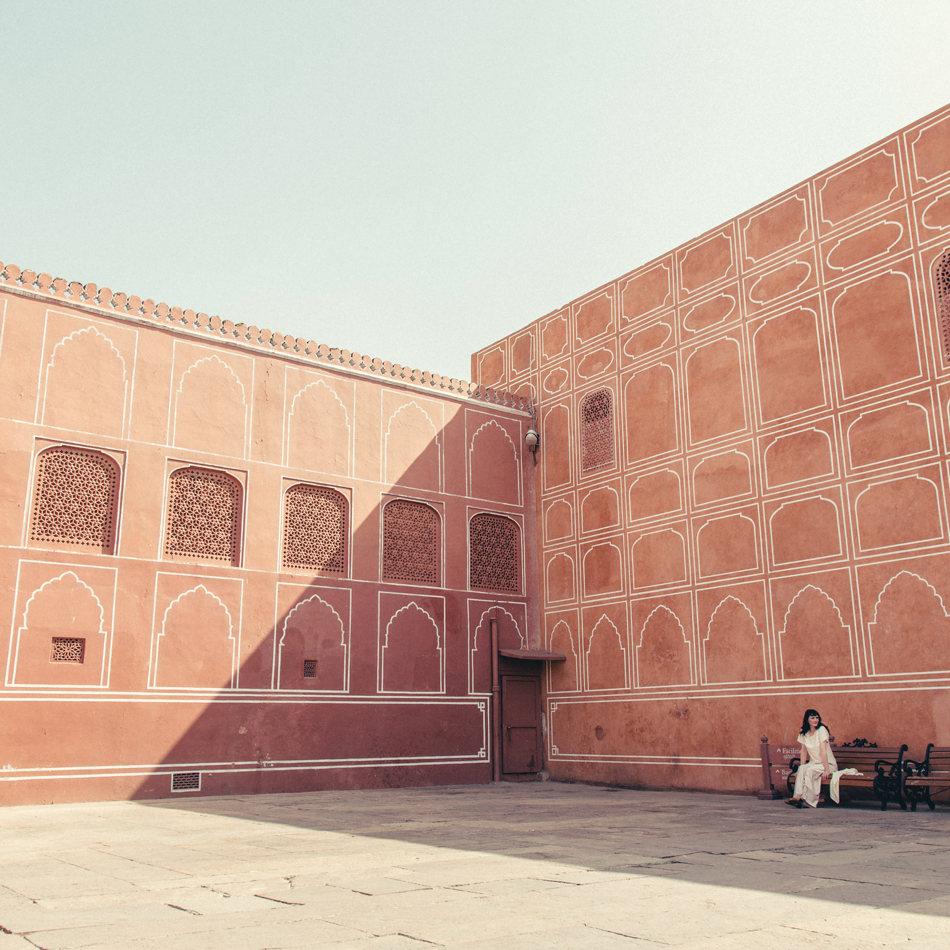Eva Power, Elizabeth Morrison, Deirdre Adam, Maria Grazia Chiuri and Louise Kennedy are all women who attribute much of their success to their inspiration and local partnerships in India…
If the primary definition of an “Indian summer” is a period of unusually warm and sunny weather at the beginning of autumn, it might just as well refer to a late blossoming of a new career. The latter applies to a trio of Irish women who have established successful businesses later in their working lives. With manufacturing bases in India, each have prioritised giving back while at the same time safeguarding and spotlighting the traditional skills of their Indian production teams.
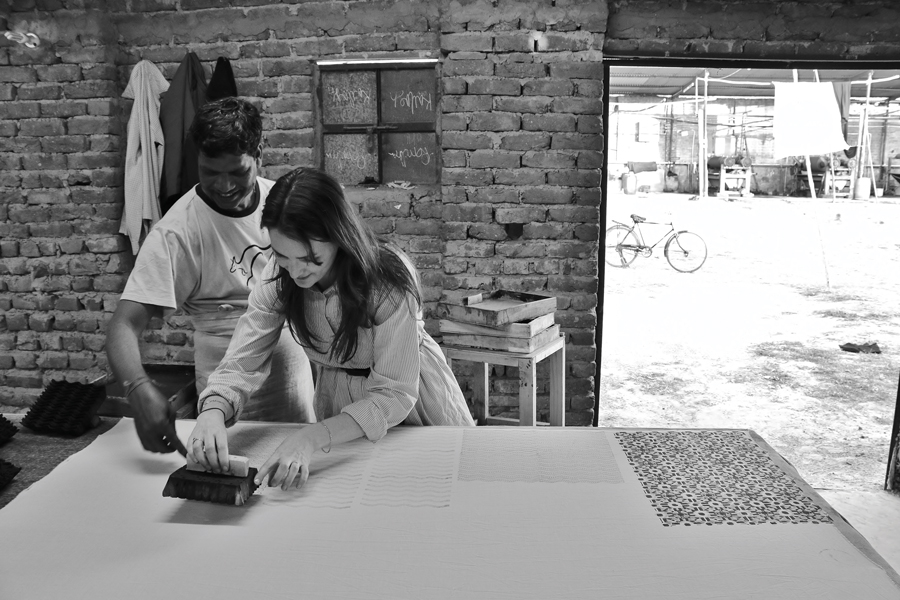
Eva Power block-printing in Jaipur.
EVA POWER, founder, The Ethical Silk Company, started travelling to India in her 20s. “My aunt has lived in Chennai, formerly Madras, the capital city of Tamil Nadu, the southernmost Indian state, for 60 years, and I grew up listening to her stories. When she returned to Ireland, she would bring back beautiful silk scarves as gifts, which my mum used to cover her pillowcases. She encouraged my sister and I to do the same, as silk is so good for the skin and hair. Silk pillowcases were very hard to come by in 2008, so I decided to start making them.”
Eva sourced Indian mulberry silk, which because of the way it is produced, resembles fine linen in texture with a matte lustre. The Ethical Silk Company produces pillowcases, robes, lounge and sleepwear, which are designed in Ireland and made in the Mehera Shaw Fair Trade sustainable tailoring unit in Jaipur. “We limit each print to short runs and repeat runs when demand dictates,” says Eva. Careful pattern placement minimises wastage and any older stock is repurposed into smaller items. The items are blockprinted using traditional methods and then dipped in a low impact dye – the pattern is stamped onto the silk by hand, one at a time.
“I launched The Ethical Silk Company in 2009 and since 2010, we have donated ten per cent of annual profits to charity initiatives, split between Focus Ireland and Jeevan Jyothi AIDS Hospice. Mehera Shaw also supports a women’s group through its Foundation development project where ethical and labour standards are adhered to. This means that we, and our customers, can have peace of mind about the ethical production of our products,” explains Eva.
After 14 years at the helm, Eva is now handing on the baton to new owners: Banke Ajayi, Fritha Vincent Mason, Shola Thomas and Margaret Ring. They will continue their valuable work with Social Enterprise Secret Projects which empowers women economically through training and the making and selling of clothing and homeware. This season, the brand will expand its mens’ sleep and loungewear range.
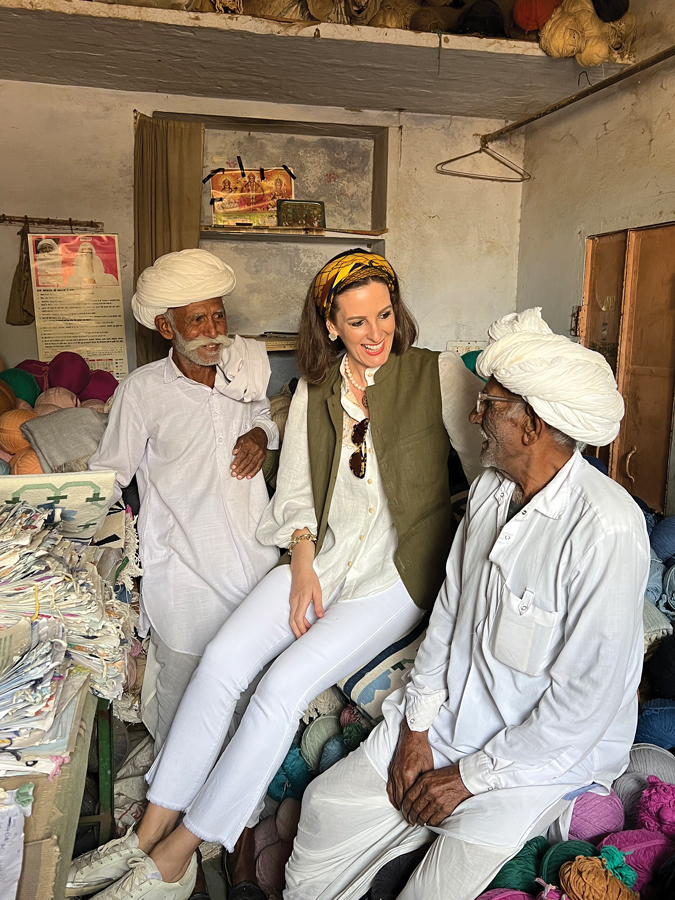
Elizabeth Morrison and the artisans who produce the rugs for From Jaipur With Love.
ELIZABETH MORRISON describes India as an assault on the senses: “It’s also a country of extremes: extreme beauty, extreme wealth, extreme poverty, extreme hospitality. It’s a country that does not do things by halves.” On her first visit 20 years ago with her then boyfriend, now husband (he proposed at the Taj Mahal), she knew the country would be a part of her future life.
Elizabeth lives in Dubai, visiting India frequently to check in with the weavers with whom she collaborates for her rug business, From Jaipur With Love. This, Elizabeth relates, was founded by accident: “My husband and I were in Jaipur for a party. We spent a few extra days there and while shopping I bought some cotton rugs or dhurries. I had just resigned from my job with the intention of staying at home and looking after our daughter, India. However, I quickly realised that retirement was not for me. A friend convinced me to sell the rugs at her pop-up sale where they sold out. Soon afterwards I started receiving calls from people asking if I could source some more. And so it began!”
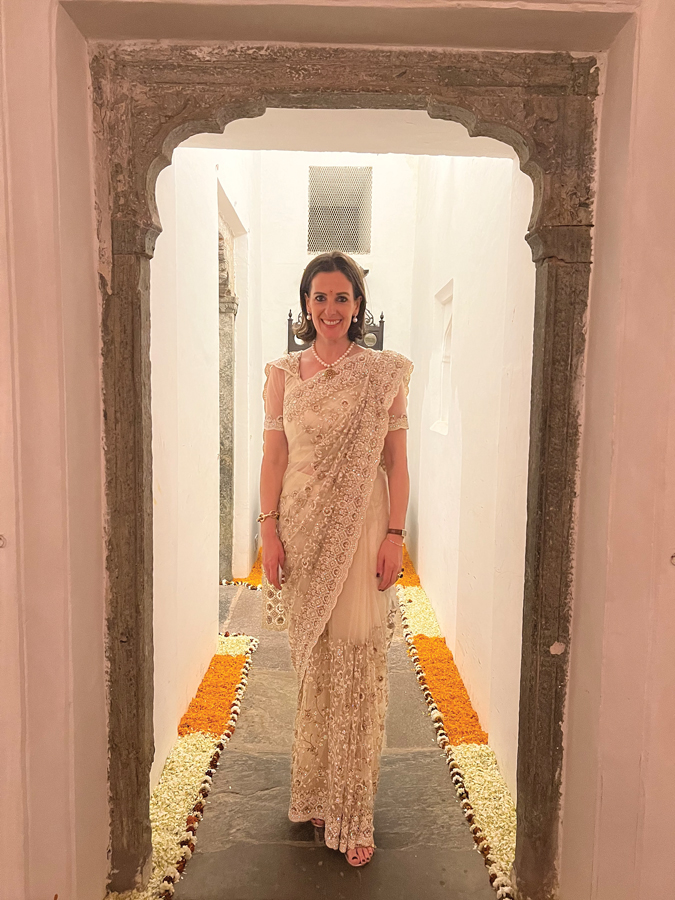
“All our weavers are co-operative weavers, meaning they work for themselves on home looms. Our job is to ensure they have regular work and to pay fair wages. This way we get to continue working with some of the most skilled families.”
Elizabeth has been inspired by Indian fashion. She has started to wear saris and Nehru jackets as well as Indian ikat designs by her friend designer Virginia DeCastro. Such is Elizabeth’s knowledge of where to shop and stay (she recommends The Imperial Delhi, The Oberoi Rajvilas, Jaipur and Villa Palladio, Jaipur), she arranges insider trips to Jaipur. Her next, planned for March 2024, managed by Darina Slattery, owner of Irish travel company Oomi Travel, is for “like-minded women interested in interiors and mindful homewares.”
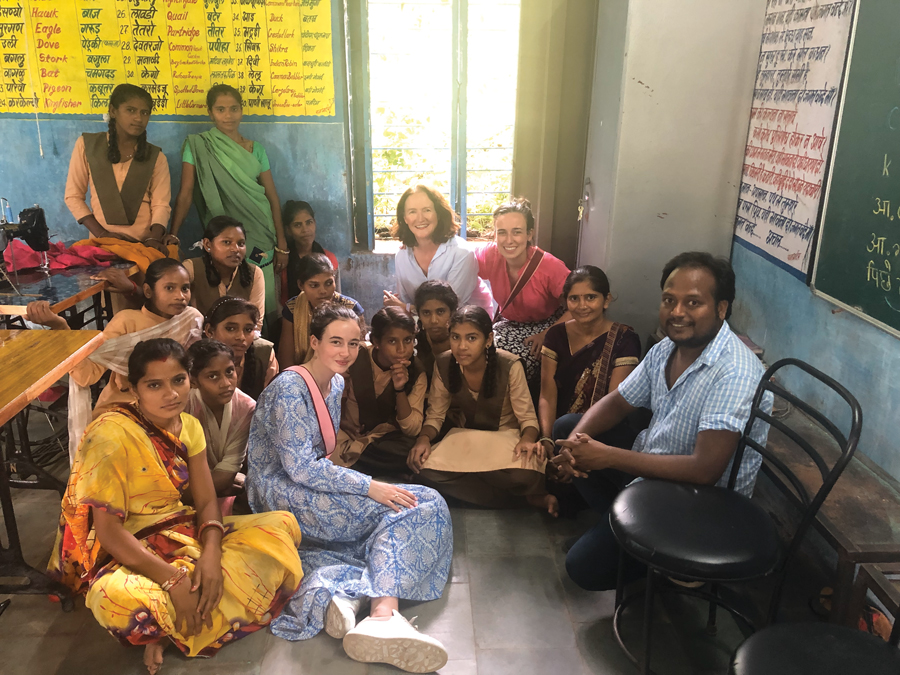
Deirdre Adams and her daughters visit a girls’ school where students can opt to learn sewing to equip them with a skill.
DEIRDRE ADAMS’ love affair with India began when she honeymooned there 30 years ago. She describes it as a “place of sensual stimulation, somewhere that requires visitors to lean into the rhythm the country to fully experience its unique magic. The palaces are beyond beautiful with a history to match.”
Deirdre returned with her daughters, Síofra and Maeve, when she started her business, JimJams, in 2019. “When I had hip replacement surgery, I couldn’t find beautiful pyjamas to take into hospital; the choice was limited to either high street or very expensive options.” So impressive was Deirdre’s idea for JimJams, she won a place on the Arnotts Pitch 21, which champions new Irish brands. Her first collection, designed in Ireland and made in India, sold out at the annual Gifted fair in the RDS that year. “Our manufacturing partners are members of the World Fair Trade Organisation and of the Fair Trade Federation in the US,” she explains. Deirdre sought out like-minded business partners. “As a former lawyer, I had been involved with an Irish domestic violence charity and wanted the empowerment of vulnerable women to be part of the business model. I’m proud to say JimJams supports Project Thrive in Delhi, which provides training and employment opportunities for vulnerable women who would otherwise remain trapped in poverty. The project also develops artisan community partnerships which further expands the reach of the social impact to rural communities.”
The long and short pyjamas, made from sustainable organic cotton finished with French seams, are available in six prints, chosen for their symbolism. “I adore the hydrangea print from our botanic collection; hydrangeas send us an important message to keep going and never give up. Even when the weather is not as warm as it might be, the hydrangeas keep blooming all summer long,” says Deirdre. The new Guillamene print, celebrating the sea and the joys of sea swimming, is named after Deirdre’s favourite swimming spot in Tramore, Co Waterford. She is looking ahead to future trips. “If in Delhi, must-dos are a sunrise cycling tour of the old town and a visit to Bukhara restaurant, famous for its daal Bukhara, which takes over 24 hours to cook. In Jaipur, I always stay in the Johri hotel and recommend a visit to Nila House, a non-profit organisation which celebrates Indian craftsmanship, founded by Lady Carole Bamford.”
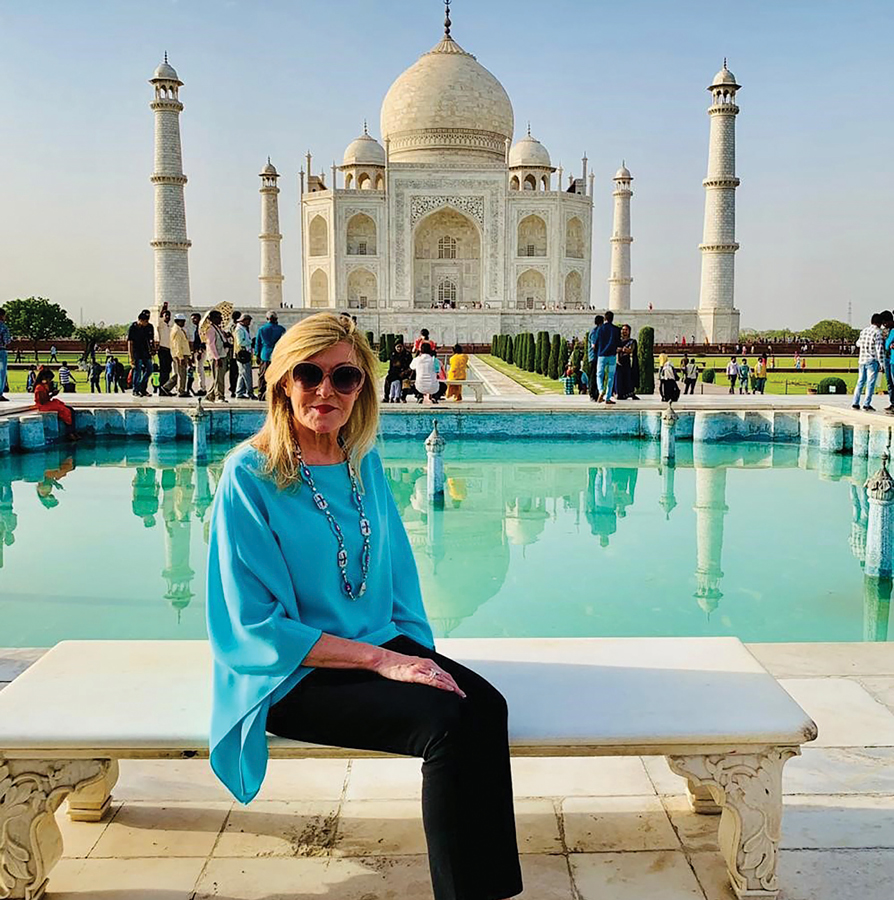
Designer LOUISE KENNEDY has been travelling to India for over 20 years, and calls New Delhi one of her “homes from home”. There she works alongside the artisans who embellish her collections. “It’s always a thrill to watch new collections brought to life by talented craftspeople as they hand-bead the hems of our dresses and add fabulous detailing to our skirts, knitwear, and jackets,” she says. Louise also sources new additions to her jewellery collection – sapphire and onyx beads, baroque pearls and Swarovski elements.
While work trips are always packed with meetings, Louise also catches up with old friends and familiar haunts including The City Palace, Jaipur and the Leela Palace hotel. The latter is in the diplomatic enclave of New Delhi, its rooftop terrace offering expansive views of the city. “I am forever inspired by sensory and visual touchpoints in the countries I visit, and India provides an abundance of these.”
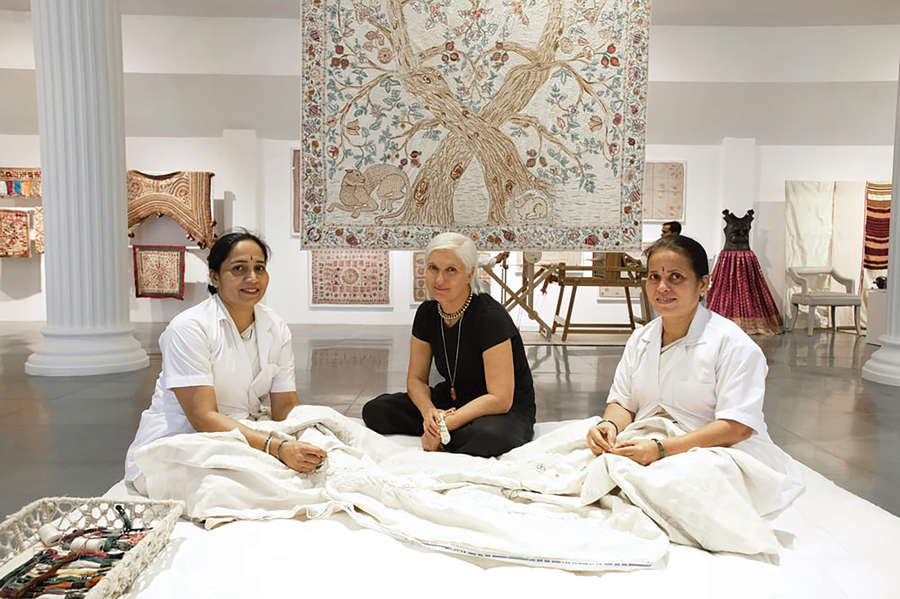
Maria Grazia Chiuri with some artisans from the Chanakya School of Craft in Mumbai.
MARIA GRAZIA CHIURI, creative director of Dior, has a longstanding admiration of India and its craftsmanship, cemented by her 30-year relationship with the Mumbaibased Chanakya School of Craft. This atelier offers an impressive range of specialisations from lacemaking to appliqué, as well as block printing and a variety of embroidery techniques. Shortly after joining Dior, Chiuri spearheaded the house’s funding of Chanakya. More than 800 women have passed through the school’s doors, having not only learned a skill, but gained financial independence and had fun with creative experimentation. Chanakya alumni become part of a supportive community and network. Most luxury brands working with Indian workshops tend to downplay their involvement – Chiuri credits them as co-collaborators, and appreciates their skills.
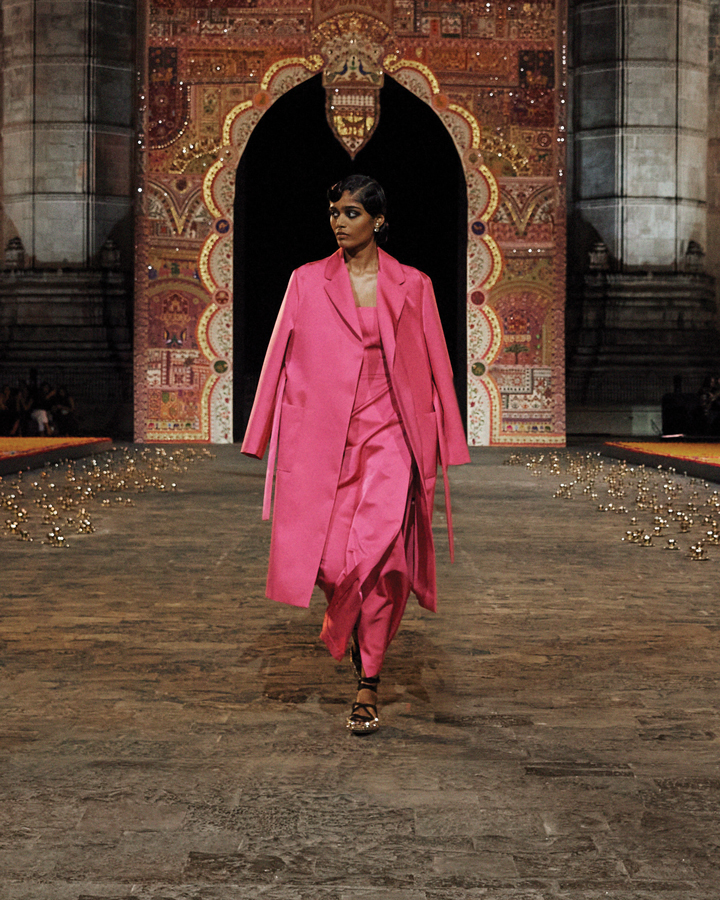
Dior
Irish Design, Made In India

Scarlet Leh mulberry silk robe, €195; www.theethicalsilkco.com.

Lily short pyjamas, €120; www.jimjams.ie.

Elia pearl necklace, €895; www.louisekennedy.com.
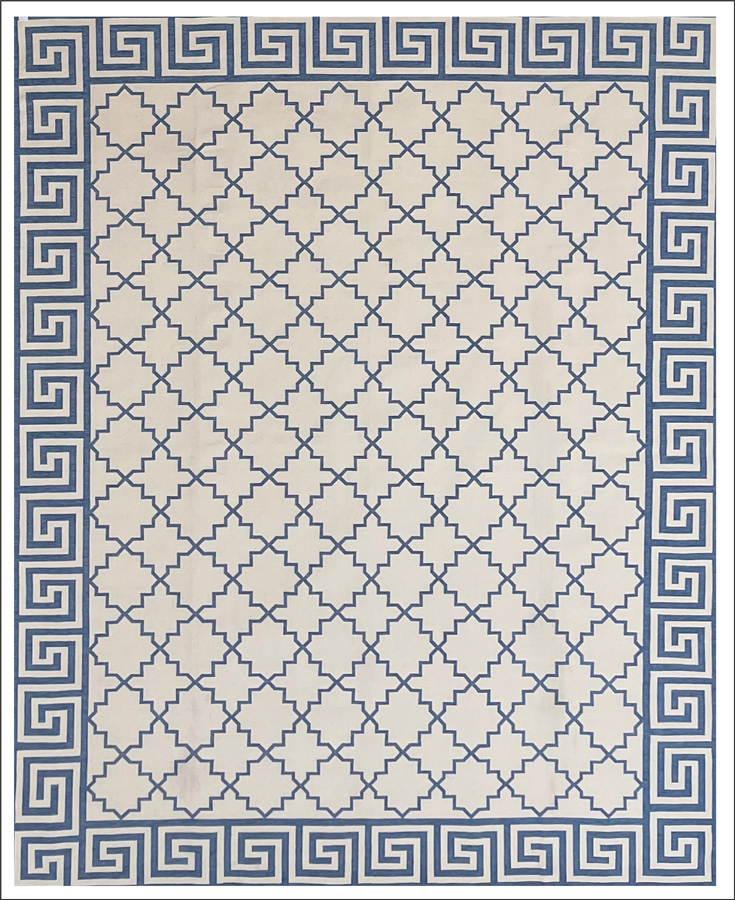
Blue and white rug from $600, based on design, rug type and size; www.fromjaipurwithloverugs.com





